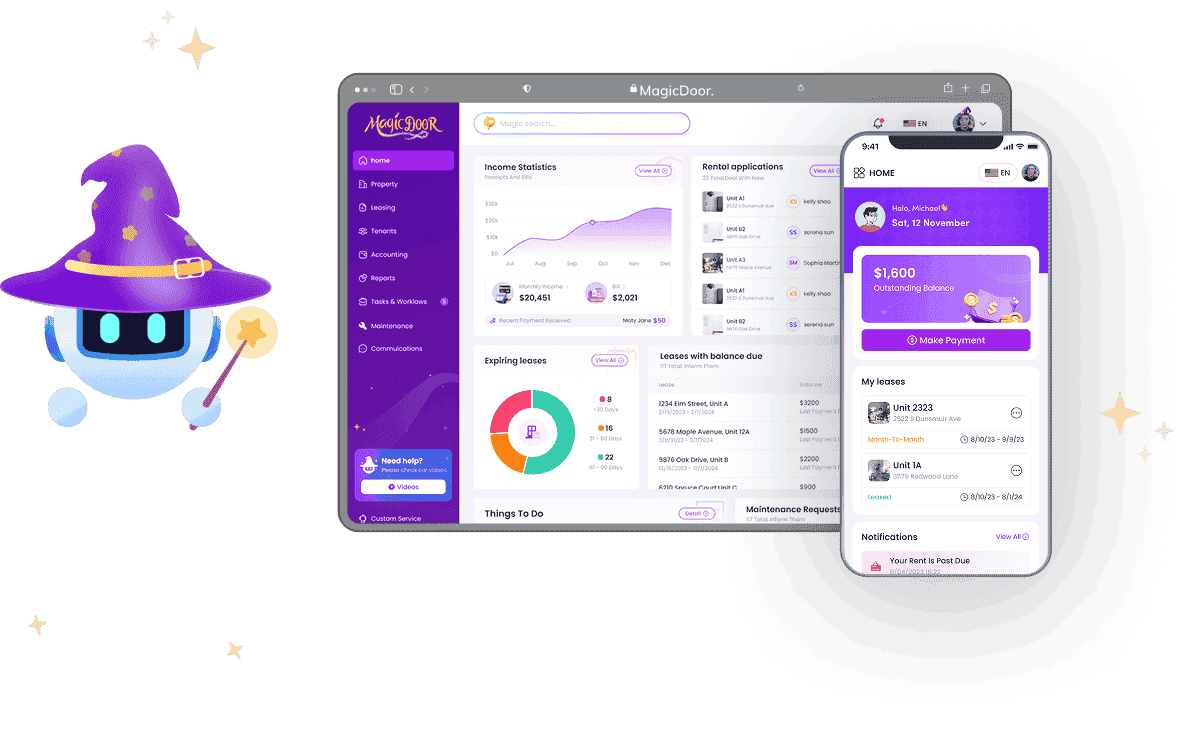Managing rentals is more than collecting rent, it’s about coordinating repairs, maintaining property value, and keeping tenants satisfied under fair housing laws.
This guide walks new landlords, portfolio owners, and property managers through the full rental lifecycle: from tenant screening and lease management to maintenance tracking and financial reporting. You’ll also see how property management software and automation make everyday tasks easier.
The goal: give you clear, actionable best practices for managing a rental property with confidence.
What is Rental Management?
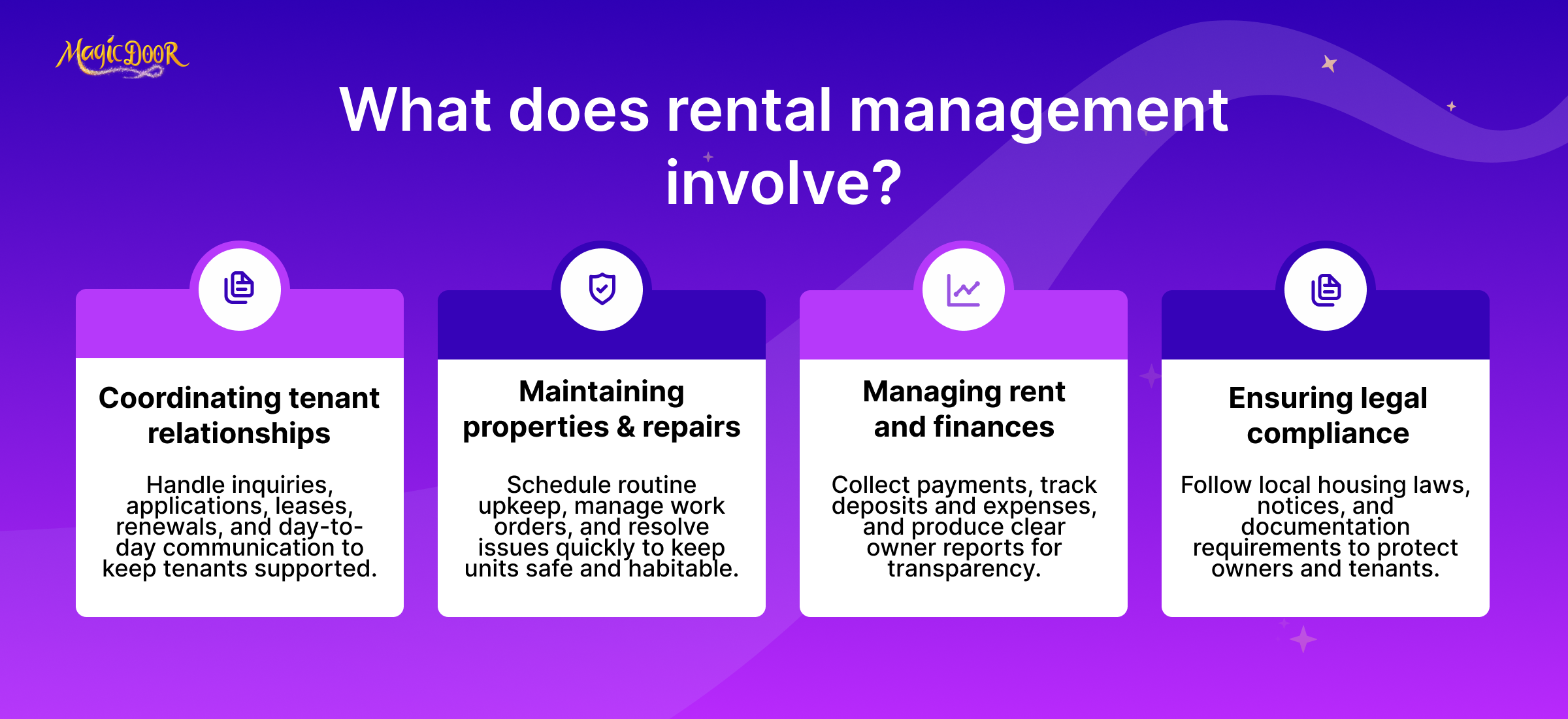
Rental management is the oversight of daily operations for a rental property, covering leasing, rent collection, maintenance requests, tenant communication, and compliance with fair housing laws. It applies to residential and commercial spaces.
For rental property owners, this can mean handling rental listings, screening prospective tenants, managing lease agreements, and tracking rental income and expenses.
A property manager or property management company can take over those responsibilities, often using rental management software to collect rent online, process maintenance requests, and provide accurate financial reports.
The main difference is control: landlords make ownership decisions for their properties, while property managers focus on daily tenant management and operations.
Responsibilities in Rental Property Management
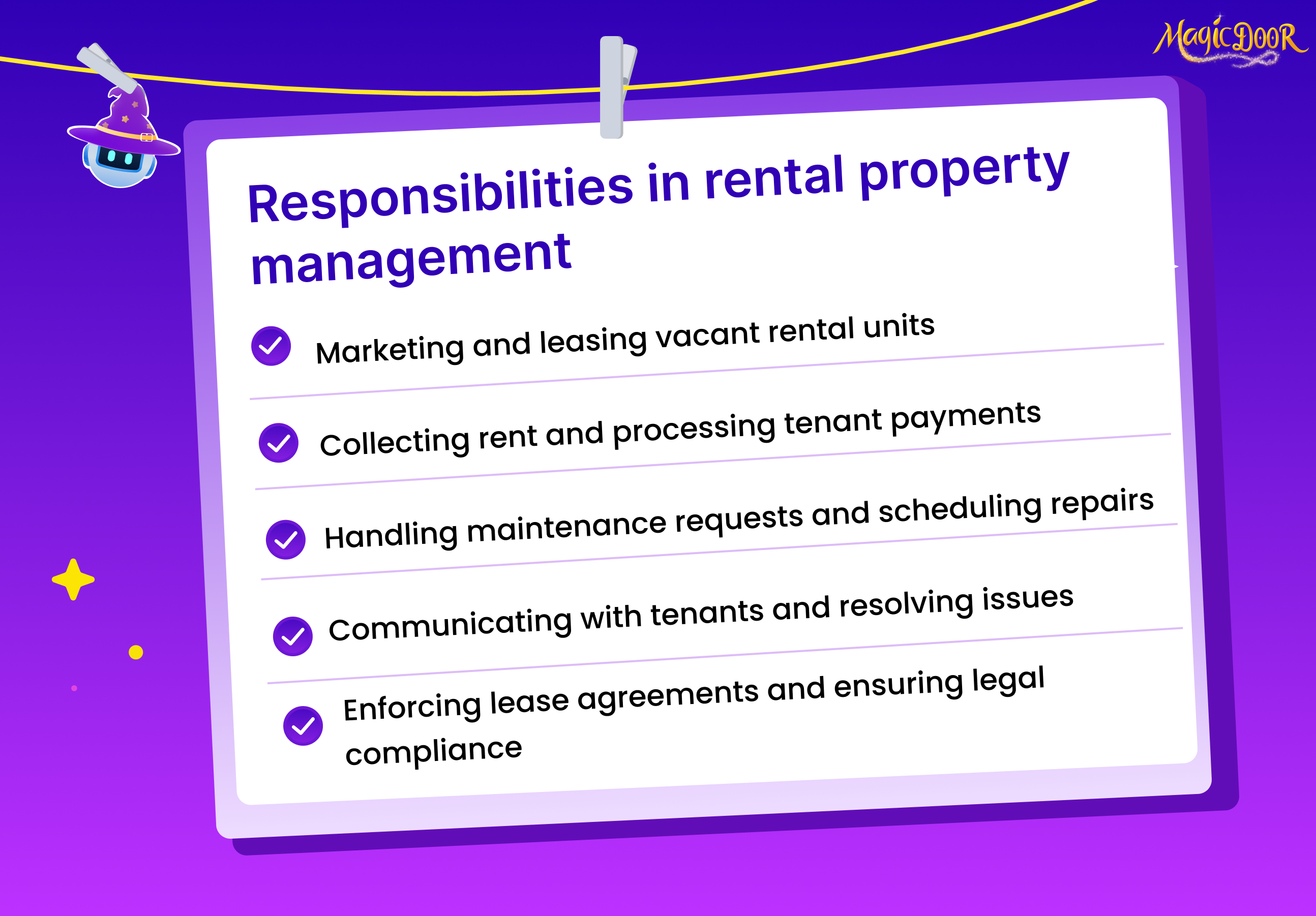
Market & Lease Vacant Units to Qualified Tenants
Keeping units occupied is the first priority in managing a rental property.
Landlords or property managers advertise each rental listing, screen tenants carefully, and confirm rental history before signing a lease agreement.
Ways to fill vacancies effectively:
- Set fair market rent based on local market trends and property inspections
- Advertise on trusted online resources to reach prospective tenants
- Screen tenants to confirm rental history, credit, and income
- Collect the security deposit and finalize lease management paperwork
Filling vacancies quickly reduces tenant turnover, maintains steady rental income, and supports long-term cash flow for property owners.
Collect Rent & Process Tenant Payments on Time
Rent collection is a central part of rental property management.
Property managers use property management software or rental management software to track rent roll, apply late fees, and record partial payments.
Ways to improve rent collection:
- Offer online rent collection tools so the tenant and landlord can handle payments efficiently
- Automate reminders for monthly rent due dates
- Track income and expense reporting for accurate financial reports
- Monitor operating expenses and property taxes against rental income
On-time rent payments keep cash flow stable and reduce management responsibilities for owners of multiple rental properties. Whether landlords self-manage or hire a full-time property manager, consistent payment tracking protects against costly repairs, missed bills, and gaps in financial management.
Respond to Maintenance Requests & Schedule Repairs
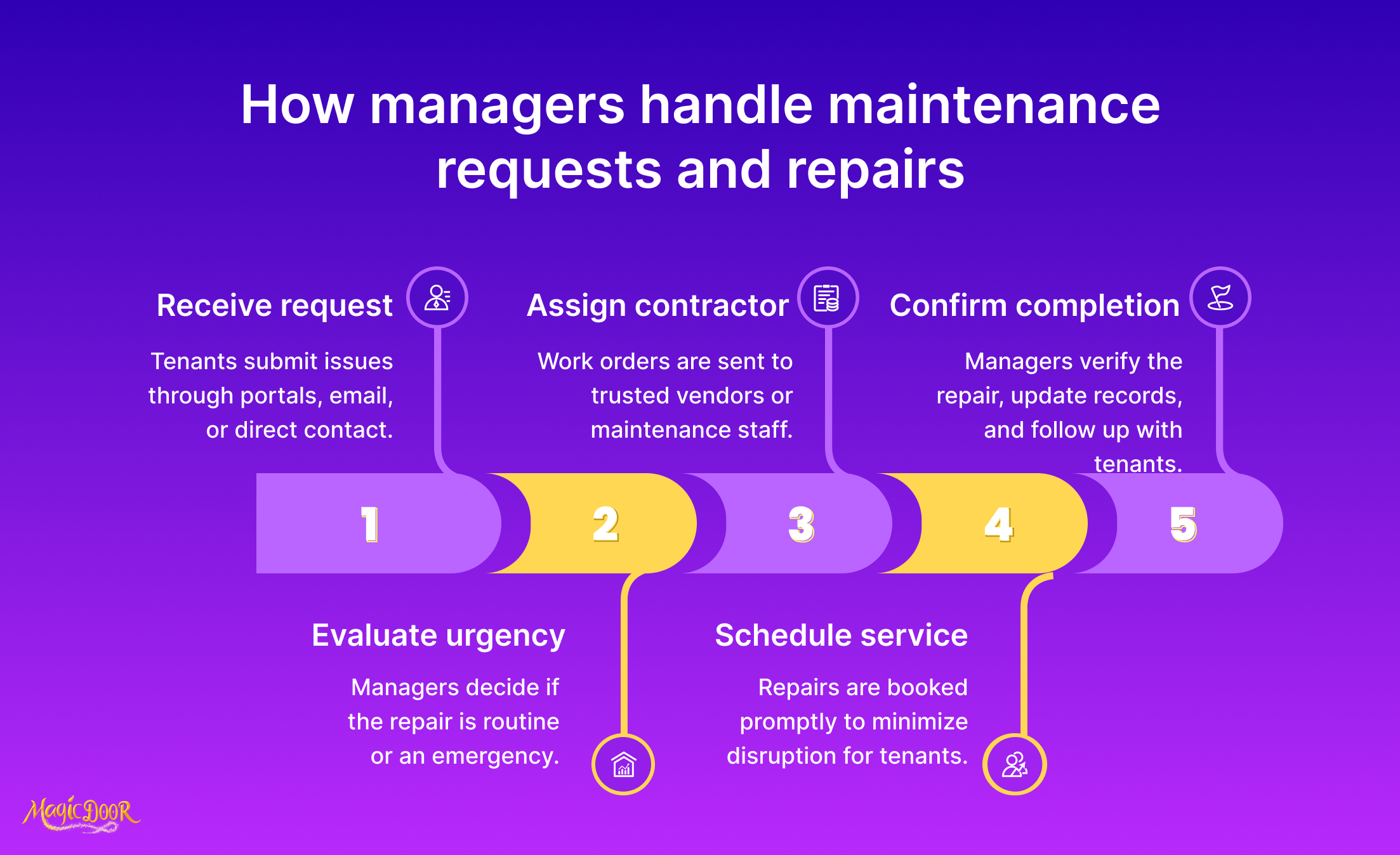
Keeping up with property maintenance is one of the most visible parts of managing a rental property.
Landlords and property managers who act quickly on tenant maintenance requests build stronger landlord-tenant relationships and avoid costly repairs.
Ways to stay on top of rental house repairs:
- Track requests through rental management software for faster response
- Prioritize urgent issues like heating, water, or safety concerns
- Schedule routine maintenance to prevent emergencies
- Document repairs for expense tracking and accurate financial reports
Responding quickly helps retain quality tenants, reduces turnover, and keeps property owners and tenants satisfied.
Communicate With Tenants & Resolve Issues Quickly
Clear communication is essential in rental property management.
Property managers handle questions about rent payments, security deposits, or lease terms, while keeping conversations professional and documented.
Practical steps for effective communication:
- Use property management software to centralize messages
- Confirm all agreements in writing to avoid misunderstandings
- Share online resources about rental laws and property rules
- Check in regularly without overwhelming tenants
Strong communication builds trust, reduces disputes, and makes managing rental properties smoother for owners who self-manage and for many real estate investors with multiple units.
Enforce Lease Agreements & Stay Compliant With Rental Laws
Lease agreements set expectations for both the tenant and property owners. Property managers enforce these rules while ensuring compliance with fair housing laws and state regulations.
Ways to stay compliant and fair:
- Outline responsibilities clearly in every lease agreement
- Apply late fees or partial payment rules consistently
- Keep records of income and expense tracking for audits or disputes
- Understand how much notice is legally required before entering or ending a lease
By enforcing agreements fairly and following rental laws, landlords and property managers protect rental income, maintain positive landlord-tenant relationships, and avoid legal issues that disrupt cash flow.
Rental Management for Different Types of Landlords
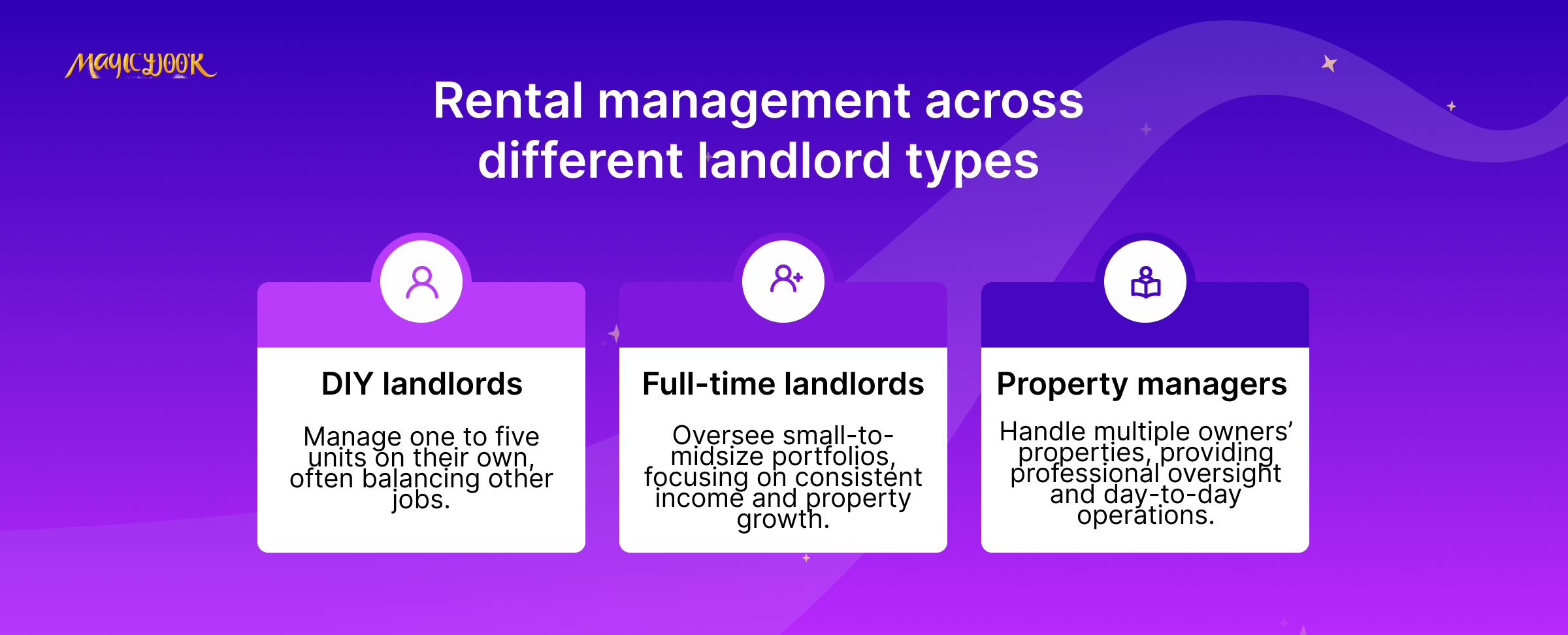
DIY Landlords Managing 1–5 Units
A DIY landlord managing one rental property or just a handful of units handles nearly everything alone. This means advertising to potential tenants, reviewing rental history, signing the lease agreement, and collecting the security deposit.
Rent payments are often tracked manually, which makes expense tracking harder.
Ways DIY landlords keep things manageable:
- Use rental management software to pay rent online and manage maintenance requests
- Stay on top of property maintenance to prevent minor issues from turning into costly repairs
- Keep financial records organized to simplify tax season
Managing a rental property without outside help can work for those who own rental property as a side investment, but it requires consistent attention to tenant management, rental income, and market trends.
Full-Time Landlords With Small-to-Midsize Portfolios
Landlords with a small or midsize portfolio, say five to twenty units, spend much of their time managing rental properties directly.
They handle rental listings, screen prospective tenants, and enforce lease agreements while monitoring cash flow across several units. The workload grows quickly as tenant maintenance requests, late rent payments, and property inspections pile up.
Practical tools that help:
- Property management software for lease management and export tax-ready financials
- Online rent collection to automate reminders and track partial payments
- Expense tracking systems to monitor operating costs and property maintenance
At this stage, many real estate investors consider hiring property managers to reduce the limitations. The shift allows them to focus on growth while ensuring quality tenants and consistent rental income.
Property Managers Working With Multiple Owners
Professional property managers oversee multiple rental properties for different owners.
Their management responsibilities include marketing vacancies, tenant screening, rent collection, and coordinating repairs. Far from a single landlord, property managers balance the needs of tenants and multiple property owners.
Effective property management requires:
- Rental property management software to centralize tenant communication and manage maintenance requests
- Financial management tools that generate accurate reports for each owner
- Knowledge of eviction process laws and fair housing compliance
This model benefits real estate investors who prefer not to self-manage.
Property management companies earn a monthly fee, but they provide structure, consistent tenant management, and detailed reporting that individual owners might struggle to maintain.
Best Practices for Efficient Rental Management
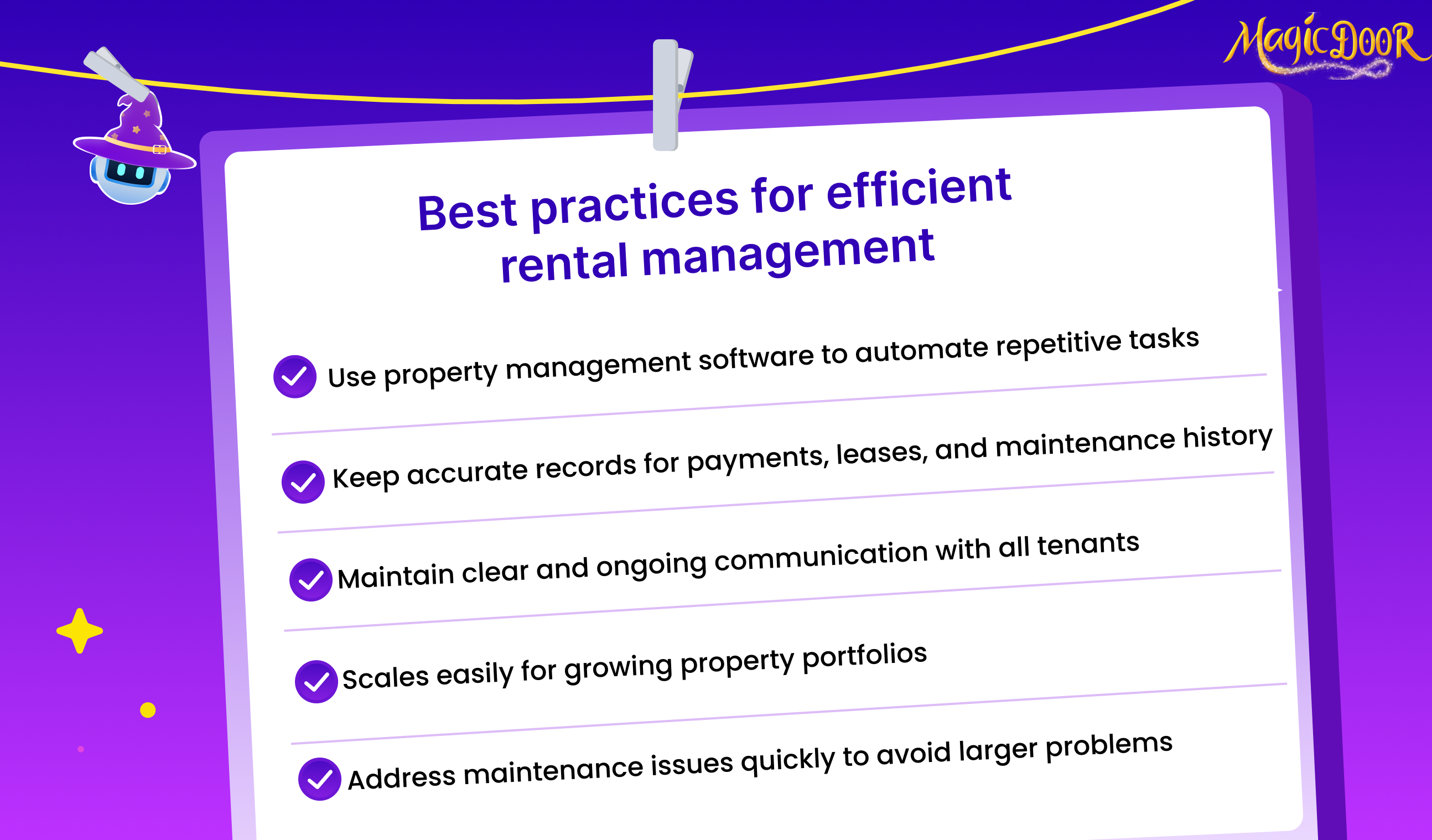
Use Property Management Software to Save Time on Repetitive Tasks
Managing a rental property involves dozens of repetitive actions, tracking rent payments, sending reminders, processing maintenance requests, and updating lease agreements. Property management software simplifies these jobs by putting them all in one dashboard.
Practical benefits include:
- Automating rent collection and late fee reminders
- Allowing tenants to pay rent online without extra steps
- Streamlining lease management and renewals
- Tracking property inspections and routine maintenance
For DIY landlords and property managers, rental management software frees time to focus on market trends, tenant management, and long-term financial planning instead of repetitive admin work.
Keep Accurate Records for Payments, Maintenance, & Leases
Rental property management depends on organized, accessible records.
Without clear documentation, property owners risk missing rent payments, losing track of expenses, or facing disputes during the eviction process.
Ways to stay accurate and audit-ready:
- Record all rent payments and partial payments in the property management software
- Store digital copies of lease agreements and security deposits
- Log every tenant maintenance request with status updates and receipts
- Use expense tracking tools to export tax-ready financials and monitor operating costs
Accurate records protect landlord-tenant relationships, simplify income and expense tracking, and provide the financial reports real estate investors need to make informed decisions.
Maintain Clear & Ongoing Communication With Tenants
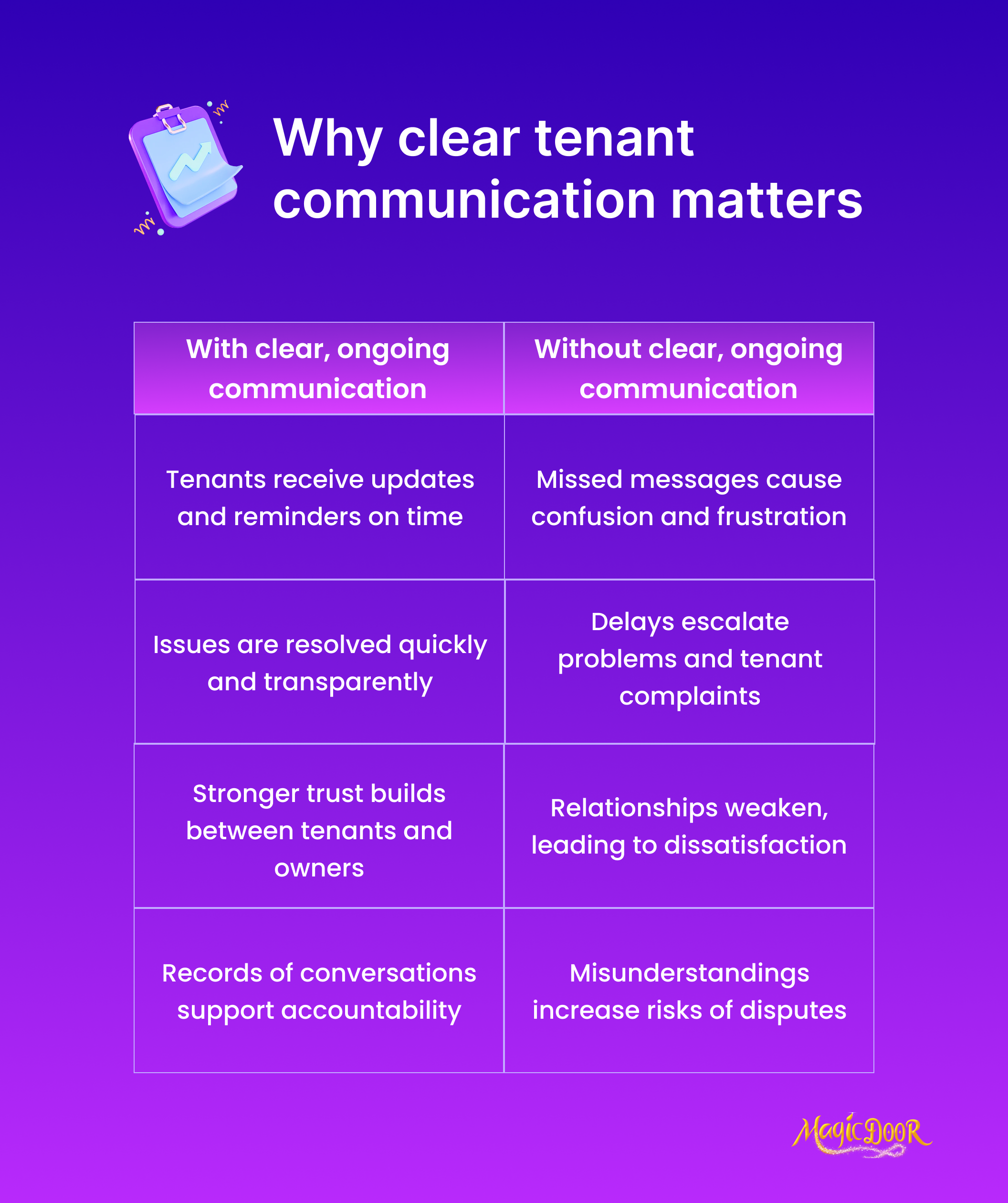
Strong landlord-tenant relationships depend on reliable communication.
Tenants need to know how to report issues, where to pay rent online, and what the process looks like for routine maintenance or lease renewals. When property managers stay accessible, small concerns don’t escalate into bigger disputes.
Helpful ways to keep conversations productive:
- Confirm lease agreement details in writing to avoid confusion
- Use property management software to centralize messages and track responses
- Share online resources about fair housing laws and property rules
- Check in during property inspections instead of waiting for tenant complaints
Short, consistent communication not only makes managing rental properties smoother but also builds trust, helping property owners keep quality tenants for longer.
Address Maintenance Issues Quickly to Prevent Bigger Problems
Every rental property requires upkeep, but how fast issues get resolved makes the difference between routine maintenance and costly repairs. A leaking faucet can turn into water damage; a broken lock can lead to safety risks.
Real estate investors who act quickly protect the tenant and the property.
Ways to manage maintenance requests effectively:
- Track tenant maintenance requests through rental management software
- Prioritize safety-related problems, such as heating or electrical issues
- Schedule recurring property inspections to identify hidden issues early
- Document repairs for accurate expense tracking and export tax-ready financials
Prompt action lowers tenant turnover, safeguards rental income, and keeps operating expenses predictable. For owners who self-manage one rental property or manage multiple rental properties, quick responses are a clear signal of professionalism.
MagicDoor: Simplifying Rental Management With No Subscription Fees
MagicDoor was built for rental property owners who don’t want the complexity or recurring costs of traditional property management software.
Instead of paying a monthly fee, landlords and property managers get a full suite of tools designed to keep rent collection, tenant management, and property maintenance simple.
What makes MagicDoor stand out for managing rental properties:
- Online rent collection: Tenants can pay rent online, and landlords can track payments, partial payments, and late fees automatically.
- Tenant management: Handle applications, tenant screening, lease agreements, and landlord-tenant relationships from one platform.
- Maintenance tracking: Log tenant maintenance requests, assign vendors, and keep accurate repair records to avoid costly repairs.
- Financial reports: Export tax-ready financials, track operating expenses, and generate clear reports that help property owners monitor cash flow.
For real estate investors with multiple rental properties or DIY landlords managing just one rental property, MagicDoor makes rental property management easier. It’s modern, transparent, and designed for property owners who want to focus on rental income rather than software fees.
Conclusion
Rental management combines leasing, rent collection, property maintenance, and tenant communication.
Landlords and property managers who stay organized, document everything, and respond quickly to issues keep cash flow steady and tenant turnover low. Prioritize accurate records, clear communication, and proactive inspections to reduce stress and costly repairs.
And when you’re ready to simplify even further, try a modern platform like MagicDoor, built for property owners who want confident, cost-effective rental management without subscription fees.

